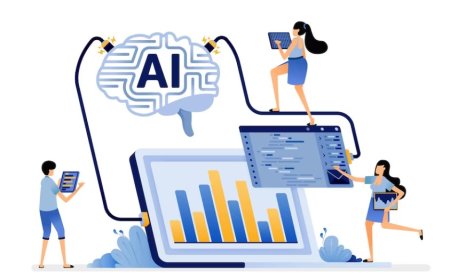A Comparative Analysis of Various AI Certifications Available in the Market
Explore the top AI certifications in the market with our comprehensive comparative analysis. Make informed decisions on your AI career path.

A rapidly evolving technological landscape, artificial intelligence (AI) has emerged as a transformative force across industries. With businesses and organizations increasingly embracing AI solutions, the demand for skilled AI professionals has soared. To meet this demand, numerous AI certification programs have flooded the market, promising to equip individuals with the necessary skills and knowledge. In this blog, we will conduct a comparative analysis of various AI certifications available in the market, helping you make an informed decision when choosing the right certification to enhance your AI career.
Machine Learning Certification
Machine Learning Certification is a specialized training program designed to equip individuals with the knowledge, skills, and practical experience needed to understand and implement machine learning algorithms and models effectively. Machine learning is a subfield of artificial intelligence (AI) that focuses on developing systems capable of learning from data and making predictions or decisions without explicit programming.
a more in-depth explanation of Machine Learning Certification:
-
Introduction to Machine Learning: The certification typically starts with an introduction to machine learning concepts and its applications. Learners gain an understanding of how machine learning differs from traditional programming and its relevance in various industries, such as finance, healthcare, e-commerce, and more.
-
Types of Machine Learning Algorithms: The certification program explores different types of machine learning algorithms, including supervised learning, unsupervised learning, semi-supervised learning, and reinforcement learning. Participants learn the strengths and weaknesses of each type and when to use them based on specific problems and datasets.
-
Data Preprocessing and Feature Engineering: Machine learning models are only as good as the data they are trained on. Therefore, the certification covers data preprocessing techniques, which involve cleaning, transforming, and preparing the data for modeling. Feature engineering, the process of selecting relevant features from the data, is also crucial in building effective models.
-
Model Building and Evaluation: Learners gain hands-on experience in building machine learning models using popular frameworks such as TensorFlow, scikit-learn, or PyTorch. They explore various algorithms like linear regression, decision trees, random forests, support vector machines (SVM), neural networks, and more
Data Science and AI Certification
Data science and AI certifications are designed to equip individuals with the skills and knowledge required to leverage data and artificial intelligence effectively. Data science is a multidisciplinary field that involves the use of various techniques, algorithms, and tools to extract meaningful insights from data. It encompasses data cleaning, exploration, analysis, visualization, and predictive modeling, among other essential aspects. AI, on the other hand, focuses on creating intelligent systems that can learn, reason, and make decisions similar to human intelligence.
Data science and AI certifications are highly sought after in today's data-driven world, where organizations rely on data-driven decision-making to gain a competitive edge. These certifications typically cover a wide range of topics, including statistical analysis, machine learning, deep learning, natural language processing, and data manipulation.
Key concepts taught in these certifications include data wrangling and preprocessing techniques, data visualization for effective communication of insights, statistical methods to analyze data distributions and patterns, and machine learning algorithms for predictive modeling and pattern recognition. Participants also gain hands-on experience using tools and programming languages like Python, R, and SQL to analyze and manipulate data.
Deep Learning and Neural Networks Certification
Deep learning, a specialized subset of machine learning, has revolutionized the field of artificial intelligence by enabling computers to learn and make decisions from vast amounts of data. Neural networks, inspired by the human brain's structure, form the backbone of deep learning algorithms. Deep Learning and Neural Networks certifications are designed to provide individuals with the knowledge and skills needed to design, implement, and optimize these powerful AI models.
These certifications typically cover a wide range of topics, starting from the fundamentals of neural networks to advanced techniques used in deep learning architectures. Participants are introduced to the key concepts of artificial neural networks, including neurons, activation functions, and forward/backward propagation. Understanding the core principles allows candidates to grasp how neural networks process and learn from data.
As the certification progresses, participants dive into the different types of neural networks, such as convolutional neural networks (CNNs) for image processing and recognition, recurrent neural networks (RNNs) for sequential data analysis, and transformer networks for natural language processing tasks. In-depth knowledge of these architectures equips learners to choose the right model for specific AI challenges.
AI Ethics and Governance Certification
AI Ethics and Governance Certification is a specialized training program designed to equip individuals with the knowledge and skills necessary to navigate the complex ethical challenges posed by the use of artificial intelligence (AI) technologies. As AI becomes increasingly integrated into various aspects of society, concerns have arisen about the potential negative impacts and misuse of AI systems. AI Ethics and Governance certifications aim to address these concerns by promoting responsible and ethical development, deployment, and regulation of AI technologies.
Here are some key points of explanation about AI Ethics and Governance Certification:
-
Understanding Ethical Considerations: AI Ethics and Governance certifications delve into the ethical implications of AI technologies. Participants learn to recognize potential biases, fairness issues, and unintended consequences that may arise when using AI systems. Understanding these considerations is crucial in developing AI applications that uphold human rights, privacy, and social values.
-
Promoting Transparency: Transparency is a critical aspect of AI governance. Certification programs emphasize the importance of making AI algorithms and decision-making processes transparent and interpretable. This transparency allows stakeholders to understand how AI systems reach their conclusions and helps build trust with users and the public.
-
Ensuring Accountability: AI Ethics and Governance certifications focus on establishing accountability frameworks to hold developers, organizations, and AI systems responsible for their actions. This includes defining clear lines of responsibility, identifying potential risks, and establishing mechanisms to address any negative outcomes.
AI in Business and Management Certification
-
AI in Business and Management Certification focuses on the strategic implementation of AI within organizations.
-
This certification equips professionals with the knowledge and skills to harness AI for improving business processes and decision-making.
-
Participants learn how AI can be integrated into existing business models to enhance efficiency and competitiveness.
-
The certification covers various AI applications in marketing, customer service, supply chain management, and financial analysis.
-
It explores the ethical and regulatory considerations of using AI in business contexts.
-
Participants gain insights into AI-driven data analysis and predictive modeling for making data-informed decisions.
-
The certification addresses the role of AI in automating repetitive tasks and optimizing workflows.
The market for AI certifications offers a vast array of options catering to diverse interests and skill levels. A comparative analysis of these certifications has revealed the richness and depth of the AI domain, with specialized programs covering machine learning, data science, deep learning, AI ethics, and AI in business and management. As AI continues to revolutionize industries and drive innovation, acquiring relevant certifications can be instrumental in advancing one's career and staying ahead in this competitive field.




























































